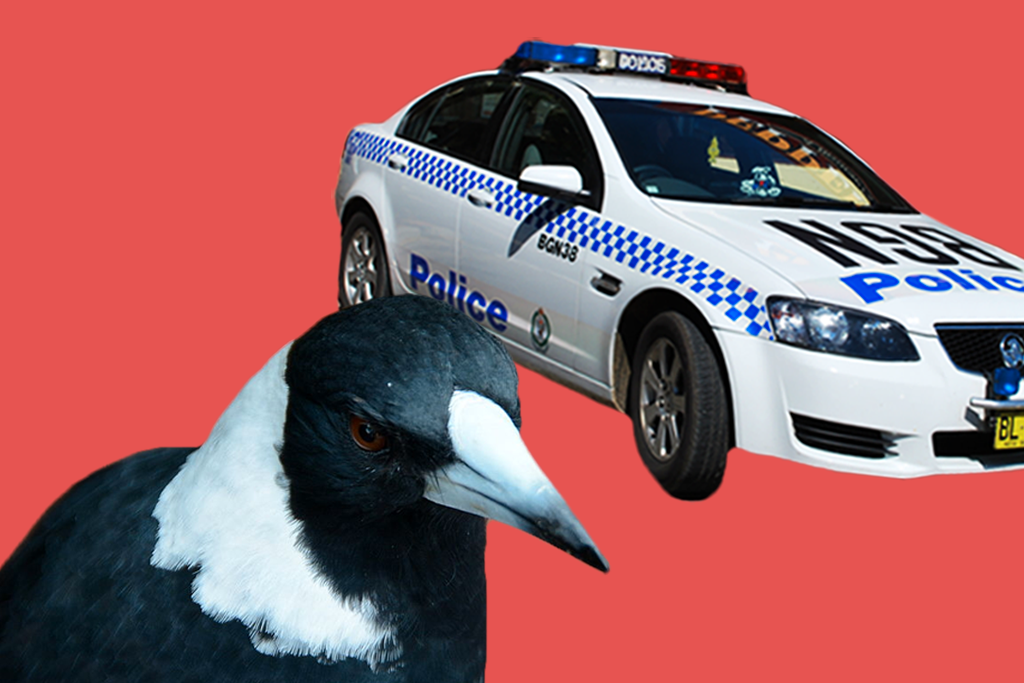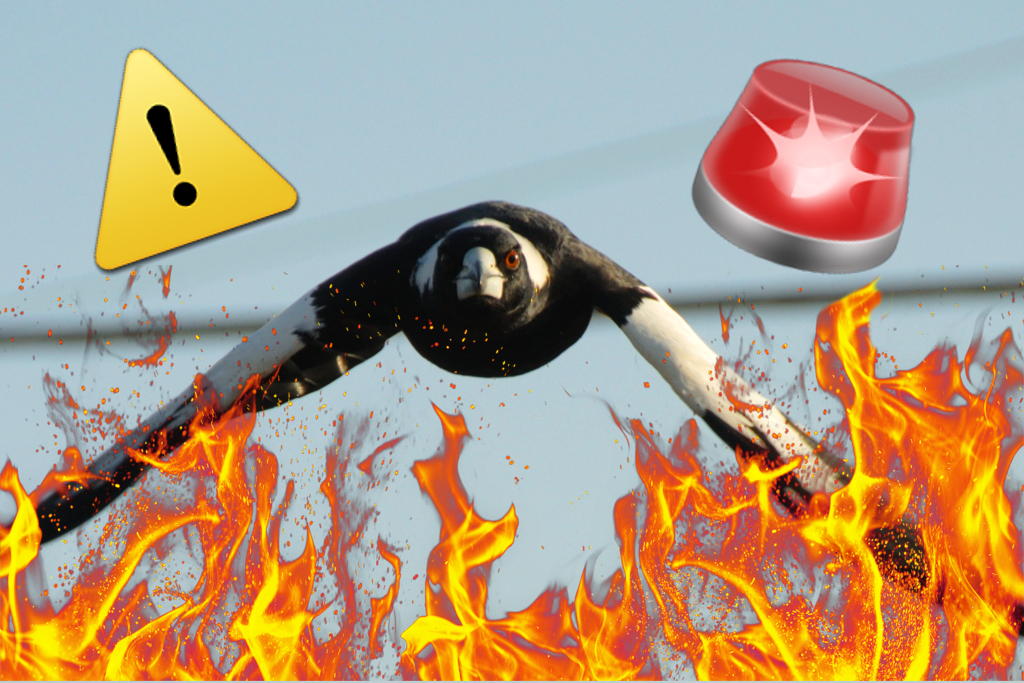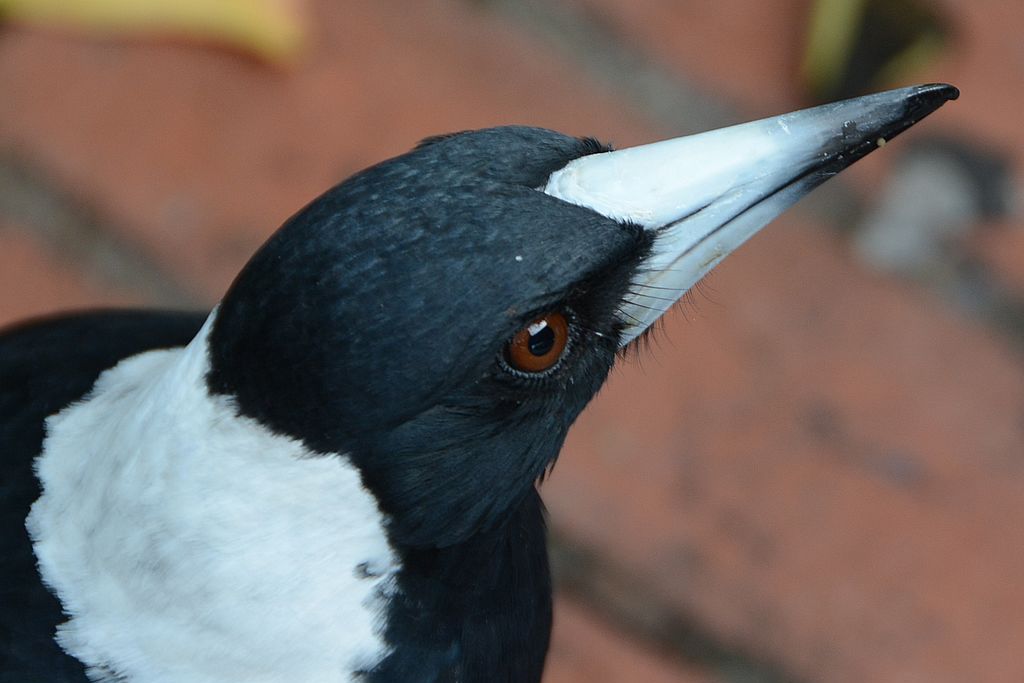What Happens When A Magpie Becomes Too Dangerous? The Cops Shoot It. With A Gun.
It's in the police handbook and everything.

Have you ever wondered what happens when a magpie starts attacking people so intensely, and so frequently, that it becomes a genuine danger to the public? Well, we regret to inform you that in some cases, the answer is that the cops get called, and the magpie gets shot. With a gun. Seriously.
You may have heard the news about this happening in Lismore just last week. As witnesses told media, two men approached East Lismore shopping centre last Tuesday and shot a magpie dead. Those men later turned out to be plain clothes cops. Witnesses told local media they were “rattled” by the incident, with one woman telling the Northern Star that she couldn’t sleep that night as a result.
But if you also think cops whipping their guns out to deal with a magpie is extreme or out of the ordinary, think again. As it turns out, shooting magpies is, in certain circumstances, actually police policy, and it’s totally legal.
Shooting A Magpie With A Gun Is What, Now?
Magpies, like all native birds, are protected by law in Australia. While the level of protection differs by state, in NSW, where last week’s shooting took place, the government makes it very clear that “it is against the law to kill the birds, collect their eggs, or harm their young”. People having a really serious problem with a magpie are directed to report it to their local council, or closest National Parks and Wildlife Service (NPWS) office.
It’s once the NPWS is contacted that things start to get interesting. Deep in the NSW service’s policy on management of native birds that show aggression to people (yes, there’s an entire 48-page document on this topic), this line appears: “where there is a demonstrated risk to public safety (as defined in section 47) the responding NPWS officer will grant consent for the aggressive bird to be destroyed”.
There are then a number of alarming stipulations related to bird destruction, including that it can only be done with a NPWS licence, only where NPWS has confirmed bird destruction is appropriate, and only where the person doing the destroying holds an appropriate firearms licence. Lots of checks and balances, but the gist of the thing is that yes, in certain circumstances where magpies are getting wildly out of hand, the official solution is to shoot them.
There’s a whole section on this in the NSW Police Handbook, too — sandwiched between the subheadings “Local Land Services Act 2013” and “Major Crime Investigation” is a section titled “Magpie Destruction”, which explains to cops that in certain circumstances, they may “destroy” an Australian magpie. The section then gives detailed instructions on the specific types of gun best suited to destroying magpies in different circumstances, and ends with a suggestion to also refer to the handbook section on prevention of cruelty to animals.
But We’re Making Sure Cops Aren’t Just Shooting Birds All Over The Place, Right?
When the Great Lismore Magpie Shooting Of 2018 took place, Richmond Police District Inspector David Vandergriend took to the Northern Star to clarify that police were absolutely following the rules there — they didn’t just “rock up”, as he put it, and think “there’s a swooping bird, we’ll shoot it”. But witnesses in the area also told media they had no idea what was going on, and no idea that the plain clothes police who shot the bird were indeed cops. Junkee spoke to Richmond Police’s Sergeant Mat Johnson to clear things up.
First things first, Johnson told us, as far as he’s aware the cops will only shoot a magpie after they’ve been approached by NPWS with a request to do so. “We never destroy any wildlife unless it’s absolutely necessary to do so,” he stressed. “It’s the last, last resort — we don’t want to do this.”
In the case of magpies, Johnson said it’s up to the NPWS to determine whether the birds are causing enough unavoidable danger to the public to act. “I can tell you now, the vast majority of police aren’t keen on culling birds, but it’s a part of our job when other people are being hurt and injured,” he said. “We understand how disturbing it is, a bit of Australian wildlife being destroyed, and happening through a weapon.”
Unfortunately, though, it’s not an uncommon occurrence. Johnson said that each year cops will be called to shoot a magpie “a couple of times in the six to eight week nesting period, when we have problems with the birds”, though for the rest of the year magpies are very docile and there’s no need.
“It’s not always just a magpie, there are other types of wildlife that also can become aggressive towards people too, and that just doesn’t work for people,” he added. “I’ve had a personal experience with a magpie swooping under two people’s houses attacking babies in their prams, and that’s just not acceptable. We can’t have that.”
As for the fact that the public apparently had no idea who the plain clothes cops were, both Vandergriend and Johnson stressed that the police are meant to alert people in the area beforehand, and said the cops did in this case. Witnesses told media the police didn’t do this though, and at this point it’s their word against the cops’.
And as for whether anyone’s really keeping an eye on what the cops do to magpies, it’s not too clear. When we asked the NSW Office of Environment and Heritage if it kept figures on the number of magpies cops kill each year, whether it feels letting cops shoot magpies is in tension with its commitment to magpies as a protected species, and whether it could confirm NPWS approached the cops to request last week’s Lismore shooting, we received a single line in response: “The NSW Police Force hold a license to harm Australian Magpie (Gymnorhina tibicen) and other protected species of native bird assessed as causing an immediate health or safety risk to humans.”
So, there ya go.

